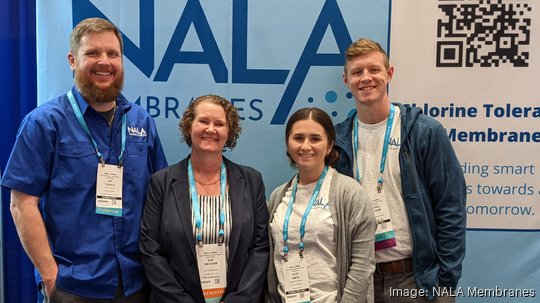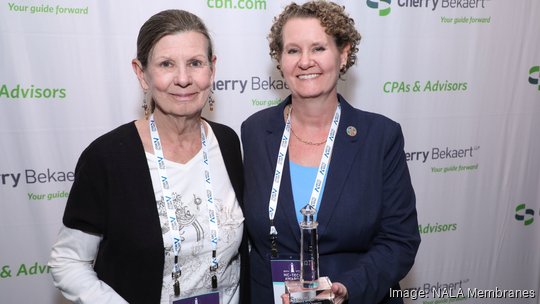
Could toilet water play a role in combatting the global water crisis? That’s part of the long-term vision of entrepreneur Sue Mecham, co-founder of NALA Membranes, a local startup looking to advance water purification technology.
According to the nonprofit Water.org, 771 million people lack access to safe water. Mecham’s startup is trying to help solve the problem using wastewater.
Over the past few years, NALA has grown from a five-person company operating out of First Flight Venture Center in Research Triangle Park to a 12-person operation with an 8,700-square-foot headquarters in Morrisville.
NALA deals in complex, engineer-heavy science. Only recently has it reached the point where it's able to send samples out to potential customers.
“We’re working toward basically getting a prototype product where we can demonstrate the full value,” she said.
For now, the value comes in the form of “tremendous operational cost savings.” The startup's technology is cheaper than what a typical industrial wastewater operation deploys today, which is why potential customers, including a mining operation in Australia, are talking to NALA.
But Mecham is thinking bigger than just industrial customers saving cash. Her larger vision is treating wastewater in a cost-effective way that ensures everyone, everywhere has access to safe water.
There’s a lot of talk about solving water challenges with seawater, but the amount of energy and costs that go into desalination are steep.
“But if you had the opportunity to reuse wastewater to make water, there’s wastewater everywhere,” Mecham said. The reverse osmosis technology NALA is researching could some day make a difference, she said.
The membranes NALA develops are suited for those kinds of applications because they can tolerate disinfectants – chemicals that destroy some other membranes used for cleaning water. Specifically, they tolerate chlorine.
Daniel McCurry, assistant professor with the Astani Department of Civil and Environmental Engineering at the University of Southern California, isn’t familiar with NALA, but is familiar with the use of membranes in cleaning wastewater through reverse osmosis. McCurry said if NALA really has cracked the code on a chlorine-tolerant solution, the market potential could be huge.
With what’s currently on the market, bacterial growth on membranes is a problem, he said. It colonizes, creating what’s essentially a “layer of slime” that clogs. “So you have to apply more pressure to the water to push it through the membrane," McCurry said.
As the membranes on the market are typically reactive to chlorine, treatment plants use alternate chemicals. The process is “a lot slower” than what they could accomplish with chlorine. As time is money, McCurry could see water systems interested in what NALA could someday be selling.
Investors have already bought into the mission. To date, NALA has raised about $4 million, half of which has come from grants. Soon NALA will be raising a bridge round to get it to a Series A next year. And the Series A will get the company to a point where it can commercialize, scale up to start doing pilot trials with customers.
Right now the NALA team is collaborating with the Orange County Water District in California, which manages the largest potable reuse water system in the world at 130 millions of gallons a day. The goal is to eventually release the clean wastewater to replenish aquifers that are being depleted.
As for Mecham’s larger vision, McCurry said the idea of treating wastewater and transforming it into drinking water is not new. But the optics have been bad.
“It sounds gross, drinking something that used to be sewage,” McCurry said. But “all those things kind of melt away as soon as a drought gets bad enough."

From academia to startup
The full vision is a long time out - but Mecham is patient. After all, NALA has already come a long way from the idea she started with.
Mecham, after a decade of working at firms such as Acadia Polymers, returned to her alma mater, Virginia Tech, to teach. It was there that she was first exposed to the technology transfer process. She was fascinated by how ideas developed at the university could become standalone businesses. So she teamed up with a fellow professor, chemist Judy Riffle, who happens to be her mother.
They founded what would become NALA in 2018.
Their early work was funded through grants from the National Science Foundation. But venture capital firms have also contributed. They include Good Growth Capital and RTP Capital.